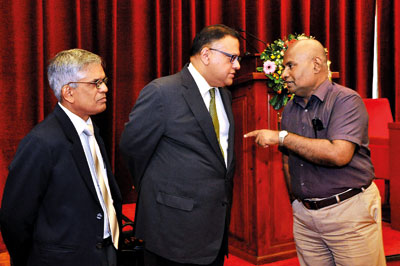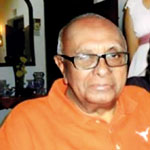Slow death awaits desperate depositors of failed finance companies

A July 24, 2015 file picture shows Ravi Rajapathirane, one of the leaders of the SCFL depositors association (right), talking to the then Central Bank Governor Arjuna Mahendran and Treasury Secretary R.H.S. Samarathunga. It was at this meeting that President Maithripala Sirisena promised to appoint a presidential commission to probe the GK crash.
While many people have died due to man-made causes such as deaths by marauding elephants, kidney problems faced by farmers; dengue fever and garbage-related issues, etc a new ‘killer’ is lurking – and, sadly, avoidable.
This is the slow death caused to many depositors of failed finance companies owing to mounting debt and loss of income. `
At least 30 have died in the struggle to recover from their loss of income from these troubled companies whose directors have either vanished (some hiding overseas) or yet to be fully investigated by the authorities. These companies are responsible for a total of about 50,000 depositors involving billions of rupees.
Most of the companies belonged or were connected to the former Ceylinco Group which crashed like a bubble burst in 2008 triggered by the collapse of its subsidiary, the Golden Key Card Co facing liabilities worth Rs.26 billion.
Depositors have been living on the interest they have been getting on their investments for their day-to-day expenses, especially for medical treatment. When these finance companies collapse the depositors do not get their interest and they are also deprived of their principal investment on maturity. When they do not get their interest money they do not have money for medical expenses, and they eventually die.
Many also die of heart failure or depression when they are unable to pay back their debtors. The number of these deaths including suicides has spiraled and now has become a notable feature in society.
One of these failed finance companies is Standard Credit Finance Ltd (SCFL), also from the former Ceylinco Group, and one of the leaders of a campaign of the SCFL Depositor Protection Society to recover their deposits was Lakshman Croos Moraes, who unfortunately died last week.
Usually they all die of heart attacks. Mr, Moraes was in hospital for one week warded at the General Hospital, first diagnosed as brain depression and then died of heart failure on May 3.
The campaign to fight to reclaim the depositors’ money of SCFL was started by three of the depositors, Ravi Rajapathirane, C.R. Barnasuriya and Sarath Senadheera around 10 years ago. Mr. Moraes joined them two years later and since then became a strong campaigner and a tower of strength, particularly because he had banking experience having being once a manager at the National Savings Bank.

Lakshman Croos Moraes
Mr. Moraes was concerned for small depositors who are most vulnerable to illness and a slow death when their deposit payment or interest income gets delayed. He worked as the convener of meetings and organizing media conferences and communication. He would be in the front line during protest demonstrations carrying placards and chanting slogans.
His co-campaigners told the Business Times that his demise is irreplaceable, but they are determined to carry forward the good work of Mr. Moraes at least as a tribute to him. They said that he had much confidence on the present Central Bank Governor, Dr Indrajit Coomaraswamy when the latter said that the matter would be resolved in one month. But when the promise did not materialize, depression set in ultimately leading to his death. The last meeting he took part with others with the Central Bank was on March 17, 2017.
Major protest campaigns by depositors of the failed finance companies were started with the collapse of the Pramuka Bank and the law suit initiated by the depositors also lasted about 10 years until they reached a final settlement.
Since then the deaths of depositors due to an inability to meet their medical expenses have increased. One such victim was Mercy Edirisinghe, the lovable, female comedian of Sinhala cinema, who died in April 2014 unable to pay her medical bills. She was an investor of the failed Central Investment and Finance Ltd (CIFL).
Like all other Sri Lankans, even these depositors believed that ‘Yahapaalanaya’ government would bring them relief, but it is now becoming just a myth.
| Pramuka Bank and what followed | |
| Since the collapse of Pramuka Bank and Golden Key, hundreds of depositors have been battling to recover their deposit and interest payments from a many failed finance companies. In a report by the Sunday Times on the Pramuka crisis in 2004, the following comments are worth recalling: K. K. Perera (36) from Panadura: “My husband died of a kidney failure and the treatment was very costly. So I had to sell our house to get the funds for his treatment which cost nearly Rs. 150,000. I deposited the balance money, which was around Rs. 700,000 in Pramuka and the interest was the only income for us. Now there is no means of living for me and my daughter, who is 10 years old. We are staying with my in-laws. I pleaded the authorities to give us our monthly interest until the bank reopens, but to no avail. We don’t know whose fault, it was, but I am sure it is not mine. I invested in a bank, which was confirmed as a legitimate body by the Central Bank of Ravi Thangarajah (36), “We invested two million rupees, which we received as donations, in Pramuka as they were offering higher interest rates. Besides, we did not have to worry as it was listed as a reliable bank in a list published in newspapers on September 12 last year but everybody knows what happened six weeks later. We experience immense difficulties in looking after 33 children. In fact, we are forced into a situation with a question whether we could continue to serve or should discontinue our service, as it is the future of innocent children that is at stake. W. D. Silva (69), pensioner from Borella: “I deposited one million which I received from the Employees Provident Fund after working at a private sector company. I was just after a surgery at Sri Jayawardenapura hospital which cost about Rs. 150,000 and I walk with clutches. However, today I don’t have any money to spend on my medicine. Now I have no means of income other than depending on `small’ loans from friends and relatives. But how long can I continue like this? It is not because we had plenty that we deposited, we did so, because the monthly interest was our only means of living. My son, who is a graduate, is still jobless.” V. R. Jayasinghe (58) from Nugegoda: “I deposited Rs. 300,000 which I got as a retirement benefit. This is my hard-earned money after working for so many years. Greed was not the reason for us to choose Pramuka Bank. Living expenses were too high and as they were offering a very attractive interest rate we went to them. Besides, we had faith in the Central Bank as a supervisor and guarantor. I lived on the interest. Now I am penniless. This situation has put a dark cloud over the entire banking system in the country and people are losing their faith in banks. Who is responsible for this? Up to date no person or institution has taken the responsibility. How did the top officials leave the country without any difficulty? The so-called `Timely’ intervention of the Central Bank has left the depositors high and dry. Now it tries to hide its negligence behind various excuses, some of them are nothing but mere jokes. The Central Bank says that the Pramuka bank was warned many times, then why did they not issue it through the media so that the depositors would get the warning? We were totally misled by wrong information by so-called responsible authorities.”
|


